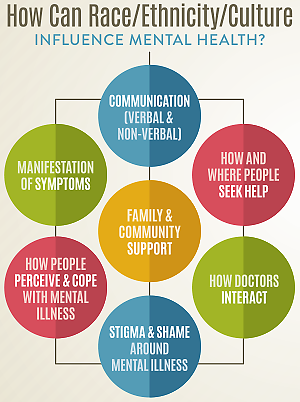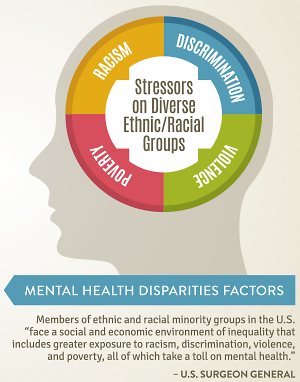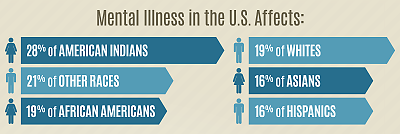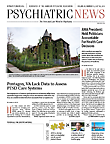This month marked the inauguration of APA’s Diversity Mental Health Month, an observance designed to bring attention to mental health disparities and service needs within diverse communities.
“Diversity Mental Health Month is APA’s opportunity to celebrate the diversity of our country,” said APA Deputy Medical Director Annelle Primm, M.D., M.P.H., during an interview at the APA annual meeting in May. Primm is also director of the APA Division of Diversity and Health Equity.
Multiple reports have suggested that mental distress is expressed differently among different cultures—with some populations being more prone to express mental illness through physicality characterized by chronic body aches and sickness, for example, while other groups may express distress through emotions. Primm said that clinicians must be aware of these differences to ensure that patients they are treating are properly diagnosed.
“Diversity Mental Health Month is a way of honoring those differences and educating psychiatrists and the general community about mental health disparities,” she noted.
During July, APA is highlighting issues affecting mental health that concern people who are part of diverse ethnic and racial groups or who experience disparities associated with sexual orientation, gender, or religion.
“It is very important that persons in minority, underrepresented, or disenfranchised groups are not the only ones to voice their opinions for mental health equity and fairness,” said Rahn Bailey, M.D., Assembly deputy representative for APA’s Caucus of Black Psychiatrists and chair of psychiatry at Meharry Medical College. “People of majority populations need to be vocal about health issues concerning minorities as well.”
Though overall rates for mental illness among diverse racial and ethnic groups are similar to those of the general population, these groups are less likely to receive treatment for mental illness than are their white counterparts, according to the landmark mental health report issued by former U.S. Surgeon General David Satcher, M.D., Ph.D., in 2001. The roots of this discrepancy may lie in several factors including diverse groups receiving poorer quality of care, lack of insurance coverage, heightened stigma associated with mental illness in some cultural groups, and poor access to culturally competent care. Because of the underutilization of mental health services, some diverse groups—in particular African Americans—are more prone to be debilitated by mental disorders than are their white counterparts.
People who are lesbian, gay, bisexual, or transgender (LGBT) have made great strides in securing some civil rights over the past decade, but discrimination and crime targeting these individuals remains a major problem (Psychiatric News, June 16).
According to the Centers for Disease Control and Prevention, LGBT individuals are more than twice as likely as heterosexuals to be diagnosed with a mental illness. Suicide attempts are two times more common among sexual minorities, and youth who identify as LGBT have a 50 percent increased risk for being bullied than youth who identify as heterosexual.
“LGBT people still suffer a good deal of distress in society and need special mental health treatment, because stigma that is associated with being LGBT is still a potent factor in our society,” commented Daniel Hicks, M.D., president of APA’s Gay, Lesbian, and Bisexual Caucus and a clinical assistant professor of psychiatry and director of consultation-liaison psychiatry at Georgetown University Hospital. “Diversity Mental Health Month emphasizes the importance of training psychiatrists to be more sensitive to certain populations to better serve patients,” he said.
Ludmila De Faria, M.D., chief medical officer at Apalachee Center in Madison, Fla., agreed. “Promoting diversity sends a signal to both providers and patients that we value different perspectives and want to understand our patients,” she told Psychiatric News.
De Faria, who is the Assembly representative for the Women’s Caucus, stated that fostering inclusiveness in the clinical setting opens doors for more people to be treated by allowing a sense of comfort and acceptance for patients.
“We celebrate diversity month to empower underrepresented populations to share their unique views and experiences with us,” said De Faria.
APA has made a toolkit available to assist members and other clinicians in treating people of diverse backgrounds. In addition, APA will be sponsoring programs throughout the nation focusing on mental health issues related to diversity, including a relaunch of its Diversity at Work program for the staff at APA headquarters and the Division of Diversity and Health Equity program “1st and Goal: Moving the Conversation Forward—Overcoming Stigma, Addressing Disparities, and Achieving the Goal of Recovery” in Cincinnati, Ohio, on July 19.
“APA will continue to stress the importance of recognizing the mental health needs of individuals from diverse communities,” stated APA CEO and Medical Director Saul Levin, M.D., M.P.A. “We hope that this APA effort will enhance awareness for the need of cultural competency in clinical practice and research for months and years to come.” ■
More information, including the toolkit, infographic, resources, references, and video for APA Diversity Mental Health Month, can be accessed
here.



